17 May2022
By Nicholas Hartlep
What do we mean by a “glass cliff?” It happens when a member of an underrepresented group assumes a leadership role during a period of crisis or downturn, when the chance of failure is highest. Research has documented the “glass cliff” for Asian Americans in corporate America; for instance, when companies are in decline, they’re two and a half times more likely to appoint an Asian American CEO.[i] This made me wonder if there is also a glass cliff for Asian American higher education leaders.
Asians make up 5% of the population, 6.5% of college students, and 8.4% of faculty members — but they comprise only 1% of college presidents.[ii] Based on an annual growth rate of 6%, racial parity in the presidency for Asian Americans will occur by 2036 (see Figure 1 below). Parity is defined as the year in which the representation of Asian Americans in the presidency reflects their overall representation in the U.S. population. Data on the future demographics of the United States come from the U.S. Census Bureau’s projections.
16 May2022
By Weade James

 AACTE’s upcoming Washington Week conference will feature speakers from national civil rights and advocacy organizations who have sought to empower and increase educational access and opportunities for disenfranchised communities. One of these organization is the National Urban League. Founded in 1910, the National Urban League, also known as The League, is a historic civil rights organization whose mission is to help African-Americans and underserved communities achieve their highest true social parity, economic self- reliance, power, and civil rights. The League promotes economic empowerment through education and job training, housing and community development, workforce development, entrepreneurship, health, and quality of life. Through their signature education programs, The League strives to ensure that every child is ready for college, career, and life.
AACTE’s upcoming Washington Week conference will feature speakers from national civil rights and advocacy organizations who have sought to empower and increase educational access and opportunities for disenfranchised communities. One of these organization is the National Urban League. Founded in 1910, the National Urban League, also known as The League, is a historic civil rights organization whose mission is to help African-Americans and underserved communities achieve their highest true social parity, economic self- reliance, power, and civil rights. The League promotes economic empowerment through education and job training, housing and community development, workforce development, entrepreneurship, health, and quality of life. Through their signature education programs, The League strives to ensure that every child is ready for college, career, and life.
 Representing The League at the upcoming Washington Week conference is Horatio Blackman, vice president of education policy, advocacy, and engagement. Blackman’s work has focused on educational improvement, access, and opportunity for marginalized communities, specifically Black youth, utilizing data and evidence to support change efforts at the local, state, and national levels. Central in his practice is engaging communities in education improvement efforts. In his role at the National Urban League, Blackman leads the Equity & Excellence Project and related education policy and advocacy work.
Representing The League at the upcoming Washington Week conference is Horatio Blackman, vice president of education policy, advocacy, and engagement. Blackman’s work has focused on educational improvement, access, and opportunity for marginalized communities, specifically Black youth, utilizing data and evidence to support change efforts at the local, state, and national levels. Central in his practice is engaging communities in education improvement efforts. In his role at the National Urban League, Blackman leads the Equity & Excellence Project and related education policy and advocacy work.
Blackman joined the League after serving as an assistant professor in the College of Education and Human Development and a research associate with the Center for Research in Education and Social Policy at the University of Delaware. Blackman is an expert in connecting evidence to policy, practice, all with a focus on supporting the needs of historically underserved communities. He is a graduate of Cornell University and the University of Pennsylvania’s Graduate School of Education.
Register today for AACTE’s Washington Week conference.
10 May2022
By AACTE
On behalf of AACTE (American Association of Colleges for Teacher Education), President and CEO Lynn M. Gangone issued the following statement in response to recent legislation meant to oppress educators and students, including, as well as legislation specifically targeting transgendered and gender non-conforming students:
“Recently, there has been a concerted effort to prevent students, teachers, and educators from discussing our nation’s history in an honest and open manner. More than 30 states have pending legislation that prohibit the discussion of issues deemed “divisive,” including discourse of indigenous people and their removal from native lands, acts of antisemitism, the Black Lives Matter movement, and sexual orientation and gender identity.
AACTE strongly opposes legislation that censors curriculum and educators and prevents students, especially LGBTQ+ students and those from historically marginalized groups, from receiving the full and safe academic experience they deserve.
Additionally, AACTE supports policies and legislation that ensure teacher candidates are appropriately trained to support LGBTQ+ students and the various communities they represent. For example, according to GLSEN, LGBTQ+ students face increased rates of school discipline—including detention, suspension, or expulsion from school. Non-binary students are more likely to say they feel unsafe in schools. In addition, transgender and gender-nonconforming youth are three times more likely than LGBQT+ students to say that they did not expect to finish high school.
Elected officials should expand educational opportunities to all students, regardless of race, nationality, sexual orientation, gender identity, or creed, rather than implement policies that limit a student’s value in the classroom. Such discriminatory policies prohibit students from reaching their full academic potential by enabling bullying, harassment, and other harmful practices.
Though couched as efforts to make sure no student feels uncomfortable or to increase parental engagement, these laws do the opposite. Teachers, counselors, and school staff should be empowered to provide safe and inclusive spaces for all students, not stifled.
Addressing historical and current events prepares students to live, participate, and empathize with diverse perspectives. Efforts to suppress inquiry and curb discussion violate the basic principles of free speech and an open exchange of ideas, which undermines the foundation of a healthy democracy through an educated citizenry.
AACTE encourages all educators to report any censorship efforts to organizations such as the American Library Association, National Coalition Against Censorship, African American Policy Forum (race/racism) and to report discrimination to the U.S. Department of Education’s Office of Civil Rights.”
10 May2022
By Allison Little
The 100Kin10 Project Team is seeking applicants to serve as faculty interested in implementing a re-imagined Intro to Education Course through a racial equity and social justice lens.
The Project Team is interested in exploring how the course can be used as a recruitment tool to diversify the teacher workforce by centering racial equity and social justice in the course content. With support through 100Kin10, the Redesigning Introduction to Education Project Team is looking to work with five faculty who can teach this course during the Fall 2022 semester and participate in a community of practice to inform the work and foster discourse around its impact on students. Faculty participants will receive $5,000 as compensation for their efforts.
For more information, visit RedesigningIntrotoEd. The application deadline is June 1, 2022.
10 May2022
By Valerie Ooka Pang

In the second article commemorating AACTE’s recognition of Asian Americans, Native Hawaiians and Pacific Islanders (AANHPI) Heritage Month, Valerie Ooka Pang, a professor in the School of Teacher Education at San Diego State University, shares her favorite literature sources for teachers to use in their P-20 classrooms. Watch AACTE’s webinar with Ooka Pang and others to learn more about AANHPI representation and inclusion in classrooms and educator preparation.
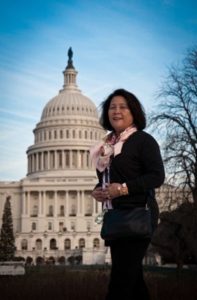 As a teacher, how often do you consciously choose literature that is about AAPI (Asian American Pacific Islander) populations or was written or illustrated by AAPI authors and artists?
As a teacher, how often do you consciously choose literature that is about AAPI (Asian American Pacific Islander) populations or was written or illustrated by AAPI authors and artists?
What do you know about AAPI children and their communities? Do you only know about Chinatowns or Chinese New Year? Stories about these singular aspects often convey stereotypical perspectives. AAPIs are people like others with dreams, fears, and hopes.
If you have little knowledge of AAPI communities and you would like to know how you can begin to integrate fantastic AAPI literature into your classroom, keep reading.
04 May2022
By Matthew Wales

In today’s world, diversity, equity, and inclusion can sometimes feel like simply buzzwords. They are trendy to say, and deemed important to acknowledge strategically, but are the actions taken by academic leaders truly enhancing diversity amongst our faculty and candidates? Is there a collective, shared sense of what equitable practices look like? And most importantly, are the decisions of leaders today creating and cultivating spaces that are inclusive to all?
As a part of its strategic plan, AACTE and its members are committed to increasing the diversity of their faculty and the students they prepare, so that educators more accurately reflect the diversity within PK-12 schools. As such, AACTE firmly believes in the need to continually assist deans, program chairs, and other academic leaders in navigating and managing the ever-changing landscape of diversity, equity, and inclusion within educator preparation. To that end, AACTE is proud to provide session content in both the dean and chair strands of the Leadership Academy that will address the following key questions:
- Why is it important to foster and promote diversity, and develop inclusive environments?
- What cultural implications do I need to attend to in the areas of teaching, research, and service?
- What specific actions are necessary to address the cultural implications in the areas of teaching, research, and service?
Working within job-alike cohorts, attendees will engage in several activities designed to “disrupt” the normal thinking around diversity, equity, and inclusion. Participants will define their own characteristics of what makes an equitable environment, and then with outside collaboration from peers, dig deeper to see just what gaps may need to be filled to create more inclusive practices and spaces. In the end, attendees will leave the session with an action list of practices to implement, which can be customized for their institution.
Don’t miss your chance to participate in this engaging and interactive look at diversity, equity, and inclusion in academic leadership. Join us June 26-30, 2022, at the Renaissance International Plaza Hotel in Tampa, FL, where you can choose from one of three track options
- New Chairs and Academic Leaders – June 26-28
- New and Seasoned Deans – June 28-30
- Full Conference (All Sessions) – June 26-30
Be sure to check out the schedule of content to be offered this year and reserve your spot today for AACTE’s new and improved Leadership Academy experience.
03 May2022
By Michael Rose

National Teacher Appreciation Week is May 1 through May 7, 2022. AACTE celebrates the work of teachers across the country and recognizes the significant contributions our nation’s teachers make in preparing today’s students for tomorrow’s world.
AACTE joins with the American Federation of Teachers and more than 200 other partnering organizations, to thank teachers for “helping every child in America lay the groundwork to build a better life, which starts right in their very own school.” In addition, the campaign recognizes that, “Despite political interference, disrespect for [their] professionalism, and a seemingly endless struggle for resources, [teachers] rise to the occasion to help prepare every child for whatever comes next, and [they] do it with incredible humanity and grace.”
02 May2022
By Eleanor Su-Keene

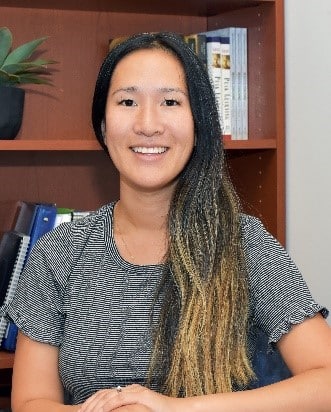
I’m not your model minority. In fact, I spent much of my life contemplating whether I’m actually a minority at all. In the United States, racial socialization runs along a Black/White spectrum, where until recently, Asian American, Native Hawaiians and Pacific Islanders (AANHPI) communities existed outside of mainstream racial dialogue. If I may elaborate. As a society, people move through in different ways, and it is only when you come across barriers or lack the privilege afforded to others based on race, that you experience oppression and injustice firsthand. Asian Americans occupy a contentious, invisible space in which race is operationalized as simultaneously a privilege and a form of discrimination. As Cathy Park Hong wrote in Minor Feelings, “Asians lack presence. Asians take up apologetic space. We don’t even have enough presence to be considered real minorities. We’re not racial enough to be token. We’re so post-racial we’re silicon.”
20 Apr2022
By Weade James
 Performance assessments that serve as a gateway to teacher preparation programs (i.e., Praxis Core, similar state-developed assessments) are intended to measure students’ basic skills in reading, writing, and mathematics. While these skills have no correlation to a candidate’s ability to be successful in a preparation program or relationship to effective teaching, many states require educator preparation programs (EPPs) to ascribe to the use of entrance assessments as a perquisite for program admissions.
Performance assessments that serve as a gateway to teacher preparation programs (i.e., Praxis Core, similar state-developed assessments) are intended to measure students’ basic skills in reading, writing, and mathematics. While these skills have no correlation to a candidate’s ability to be successful in a preparation program or relationship to effective teaching, many states require educator preparation programs (EPPs) to ascribe to the use of entrance assessments as a perquisite for program admissions.
The AACTE Consortium for Research-Based and Equitable Assessments (CREA) is examining how cut scores are being set for these assessments and its impact on aspiring teachers and the teacher-of-color pipeline. In its recent infographic, The Impact of Program Entrance Assessments on Aspiring Teachers and the Teacher of Color Pipeline, AACTE highlights key themes and findings from focus groups held with in-service teachers, teacher candidates of color at various institutions, and faculty of historically black colleges and universities (HBCUs).
19 Apr2022
By Margaret Gerry
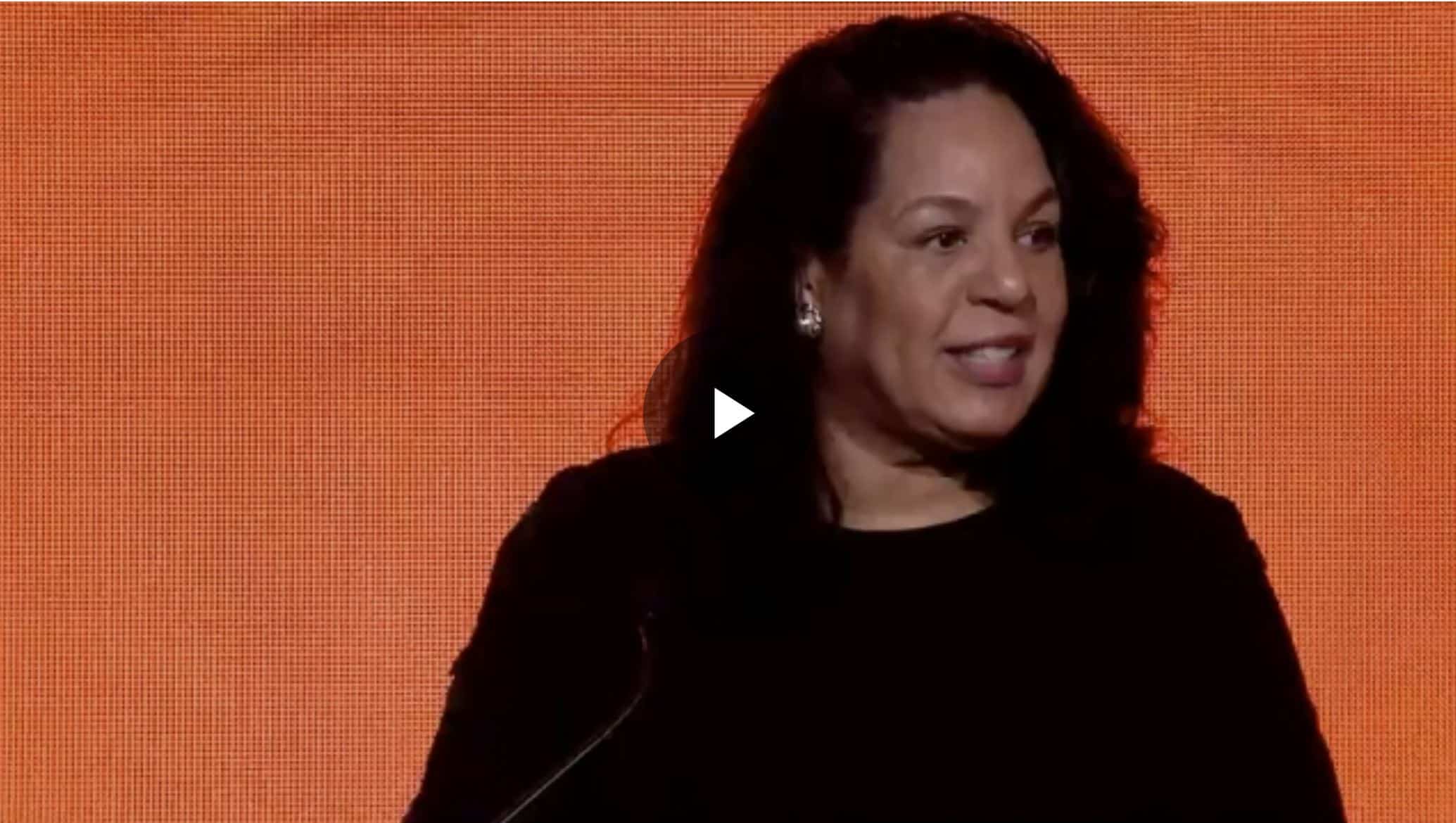 The AACTE 74th Annual Meeting culminated with a closing session keynote address by nationally renowned educator, education policy scholar, and best-selling author, Leslie T. Fenwick, Ph.D. Throughout her career, Fenwick has made significant contributions to the field of education, serving as the dean of Howard School of Education, and currently as AACTE’s dean in residence. In the closing keynote session, Fenwick shared insight and key themes from her book, Jim Crow’s Pink Slip: The Untold Story of Black Principal and Teacher Leadership, and she concluded with a series of recommendations to diversify the nation’s educator workforce and redefine school reform.
The AACTE 74th Annual Meeting culminated with a closing session keynote address by nationally renowned educator, education policy scholar, and best-selling author, Leslie T. Fenwick, Ph.D. Throughout her career, Fenwick has made significant contributions to the field of education, serving as the dean of Howard School of Education, and currently as AACTE’s dean in residence. In the closing keynote session, Fenwick shared insight and key themes from her book, Jim Crow’s Pink Slip: The Untold Story of Black Principal and Teacher Leadership, and she concluded with a series of recommendations to diversify the nation’s educator workforce and redefine school reform.
19 Apr2022
By Christopher M. Claude
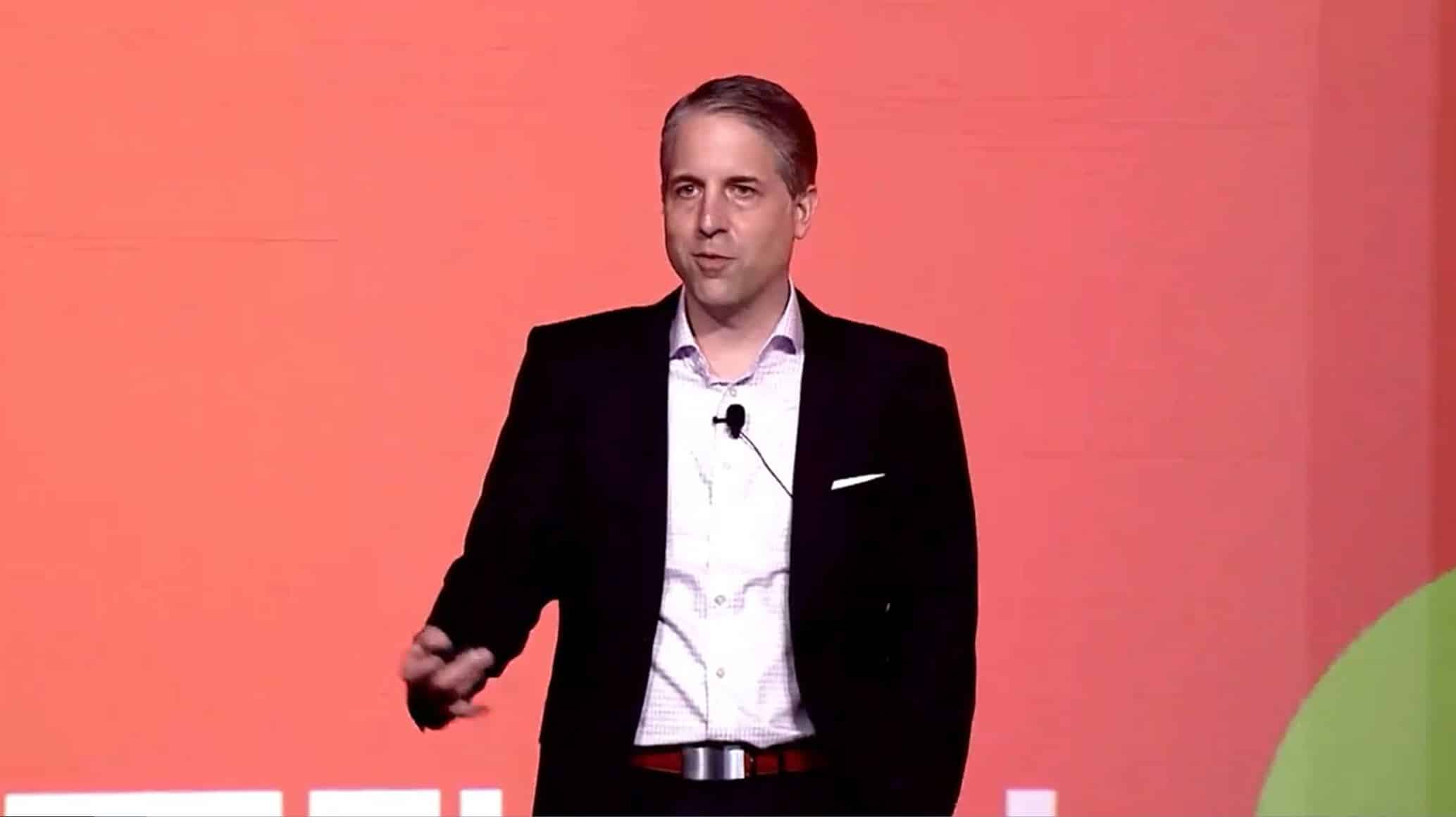 Derek Black J.D., a law professor at the University of South Carolina, is among the nation’s foremost experts in education law and policy. He’s published extensively in prestigious journals and been cited by the Supreme Court of the United States. In his book, Schoolhouse Burning: Public Education and the Assault on American Democracy, Black explored the legal and historical basis for the right to public education.
Derek Black J.D., a law professor at the University of South Carolina, is among the nation’s foremost experts in education law and policy. He’s published extensively in prestigious journals and been cited by the Supreme Court of the United States. In his book, Schoolhouse Burning: Public Education and the Assault on American Democracy, Black explored the legal and historical basis for the right to public education.
According to Black, the inspiration for Schoolhouse Burning came from the teacher strikes in 2018. Seeing tens of thousands of teachers expressing their right to peacefully protest compelled him to “pay homage to all that [educators] are bringing to the American public.” It is with this spirit that he addressed the attendees at AACTE’s Opening Session at it 2022 Annual Meeting.
The guiding question behind Professor Black’s book is simple: are we moving closer to the original vision of public education, or further away from it? That is, his book chronicled the fight for public education. Using historical and legal precedents such as the Northwest Ordinances of 1785 and 1787, The Colored Peoples Convention in Charleston in 1865, and the Brown V. Board of Education decision, Black explained why the state must provide education as a democratic necessity, and how formerly enslaved African Americans were among the key figures in the fight for educational equality for all.
18 Apr2022
By Ashley Kang
This article originally appeared on Syracuse University School of Education website and is reprinted with permission.
 Tiffany Hamm, a fourth-year science education doctoral student, formerly taught earth science in her hometown of Bronx, New York. She chose the School of Education to pursue a Ph.D. because she wanted to do more in the field. Making science accessible is key, she says, both in her pursuit of a doctorate and for the next generation.
Tiffany Hamm, a fourth-year science education doctoral student, formerly taught earth science in her hometown of Bronx, New York. She chose the School of Education to pursue a Ph.D. because she wanted to do more in the field. Making science accessible is key, she says, both in her pursuit of a doctorate and for the next generation.
“Bringing science back to the community in a tangible way can help students of color and students of underrepresented backgrounds gain interest,” Hamm says. “We need to keep showing different faces in science, keep diversifying the science field, and diversifying images of scientist and their contributions.”
05 Apr2022
By Thelma Quardey Missedja
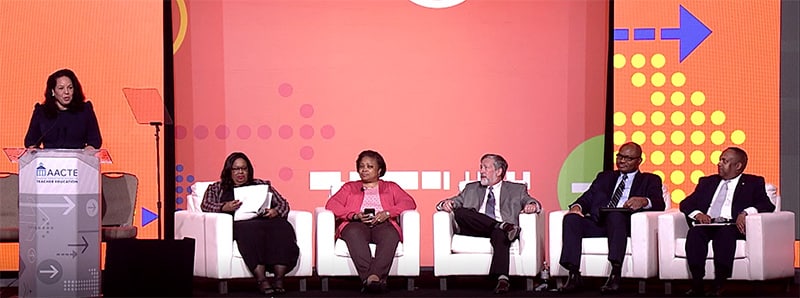
The “Minority Serving Institutions as Drivers of Educational Equity” Deeper Dive session at this year’s Annual Meeting provided insight on the essential role minority serving institutions (MSIs) play in providing postsecondary access to students of color, preparing diverse educators for the workforce, and increasing the economic mobility of low-income, first-generation college students. The session focused on unique programs, supports, and partnerships that these institutions offer to attract and prepare diverse teachers. The panel for the session included deans from four MSI schools or colleges of Education: J. Fidel Turner (Clark Atlanta University), Chinaka DomNwachukwu (California State University-San Bernardino), Stephen Silverman (Florida Atlantic University), and Denelle Wallace Alexander (Norfolk State University).
04 Apr2022
By David Fuentes
This article was originally published in Teachers College Record and is reprinted with permission.
There are deeply ingrained structural inequalities in schools that require immediate action. As antiracist educators, we must ask questions about school equity to disrupt the inequality of school outcomes we continue to see today. Who teaches the students? Who gets new schools? Who graduates from high school, and who goes to college? Who gets labeled and sorted? What can (antiracist) educators do? These questions are profoundly antiracist because they are overwhelmingly multicultural. By asking profoundly antiracist questions about schools today, I highlight areas and issues of schooling that require immediate action, antiracist efforts, to address the inequalities that exist as evidenced by educational statistics. Based on the analysis of school outcomes presented in this research note, it becomes clear that Black, Indigenous, People of Color (BIPOC) students continue to experience disparate school outcomes in America. Such inequalities reveal that BIPOC children are taught by underpaid teachers, learn in schools that are falling apart, are labeled and sorted at disproportionate rates, and endure a curriculum about other people, and generally are being underserved in schools, as evidenced by the school outcomes. Educators must take immediate antiracist actions to ensure that school equity does not continue to be defined by racial inequality.
29 Mar2022
By Laura Mogelson
 I serve as the legislative liaison for the Minnesota Association of Colleges for Teacher Education (MACTE), a consortium of over 20 public and private institutions of higher education. We represent both urban and rural geographic regions and we range in size. In Minnesota, we are unique in that the governor is a democrat, the house is majority democrat, and the senate is majority republican.
I serve as the legislative liaison for the Minnesota Association of Colleges for Teacher Education (MACTE), a consortium of over 20 public and private institutions of higher education. We represent both urban and rural geographic regions and we range in size. In Minnesota, we are unique in that the governor is a democrat, the house is majority democrat, and the senate is majority republican.
Prior to the launch of the Minnesota legislative session, MACTE developed collaborative legislative priorities that guide our work with the legislature. This year our four main goals are 1) to maintain high quality teacher preparation standards and support initiatives that reflect the research base around teaching methodologies; 2) increase the diversity of the Minnesota teaching force through strategies to recruit, support, prepare, and retain teachers of color; 3) to improve the retention of teachers; and 4) to support high-quality research-based E-12 instructional practices. In my work as the liaison, I attend committee meetings and advocate our support (or opposition) to proposed legislation through written or oral testimony. I am often supported by our MACTE leadership, our faculty who are content area experts, and our teacher candidates.











 As a teacher, how often do you consciously choose literature that is about AAPI (Asian American Pacific Islander) populations or was written or illustrated by AAPI authors and artists?
As a teacher, how often do you consciously choose literature that is about AAPI (Asian American Pacific Islander) populations or was written or illustrated by AAPI authors and artists?



 Performance assessments that serve as a gateway to teacher preparation programs (i.e., Praxis Core, similar state-developed assessments) are intended to measure students’ basic skills in reading, writing, and mathematics. While these skills have no correlation to a candidate’s ability to be successful in a preparation program or relationship to effective teaching, many states require educator preparation programs (EPPs) to ascribe to the use of entrance assessments as a perquisite for program admissions.
Performance assessments that serve as a gateway to teacher preparation programs (i.e., Praxis Core, similar state-developed assessments) are intended to measure students’ basic skills in reading, writing, and mathematics. While these skills have no correlation to a candidate’s ability to be successful in a preparation program or relationship to effective teaching, many states require educator preparation programs (EPPs) to ascribe to the use of entrance assessments as a perquisite for program admissions. The AACTE 74th Annual Meeting culminated with a closing session keynote address by nationally renowned educator, education policy scholar, and best-selling author, Leslie T. Fenwick, Ph.D. Throughout her career, Fenwick has made significant contributions to the field of education, serving as the dean of Howard School of Education, and currently as AACTE’s dean in residence. In the closing keynote session, Fenwick shared insight and key themes from her book, Jim Crow’s Pink Slip: The Untold Story of Black Principal and Teacher Leadership, and she concluded with a series of recommendations to diversify the nation’s educator workforce and redefine school reform.
The AACTE 74th Annual Meeting culminated with a closing session keynote address by nationally renowned educator, education policy scholar, and best-selling author, Leslie T. Fenwick, Ph.D. Throughout her career, Fenwick has made significant contributions to the field of education, serving as the dean of Howard School of Education, and currently as AACTE’s dean in residence. In the closing keynote session, Fenwick shared insight and key themes from her book, Jim Crow’s Pink Slip: The Untold Story of Black Principal and Teacher Leadership, and she concluded with a series of recommendations to diversify the nation’s educator workforce and redefine school reform.  Derek Black J.D., a law professor at the University of South Carolina, is among the nation’s foremost experts in education law and policy. He’s published extensively in prestigious journals and been cited by the Supreme Court of the United States. In his book, Schoolhouse Burning: Public Education and the Assault on American Democracy, Black explored the legal and historical basis for the right to public education.
Derek Black J.D., a law professor at the University of South Carolina, is among the nation’s foremost experts in education law and policy. He’s published extensively in prestigious journals and been cited by the Supreme Court of the United States. In his book, Schoolhouse Burning: Public Education and the Assault on American Democracy, Black explored the legal and historical basis for the right to public education. Tiffany Hamm, a fourth-year science education doctoral student, formerly taught earth science in her hometown of Bronx, New York. She chose the School of Education to pursue a Ph.D. because she wanted to do more in the field. Making science accessible is key, she says, both in her pursuit of a doctorate and for the next generation.
Tiffany Hamm, a fourth-year science education doctoral student, formerly taught earth science in her hometown of Bronx, New York. She chose the School of Education to pursue a Ph.D. because she wanted to do more in the field. Making science accessible is key, she says, both in her pursuit of a doctorate and for the next generation.
 I serve as the legislative liaison for the Minnesota Association of Colleges for Teacher Education (MACTE), a consortium of over 20 public and private institutions of higher education. We represent both urban and rural geographic regions and we range in size. In Minnesota, we are unique in that the governor is a democrat, the house is majority democrat, and the senate is majority republican.
I serve as the legislative liaison for the Minnesota Association of Colleges for Teacher Education (MACTE), a consortium of over 20 public and private institutions of higher education. We represent both urban and rural geographic regions and we range in size. In Minnesota, we are unique in that the governor is a democrat, the house is majority democrat, and the senate is majority republican.